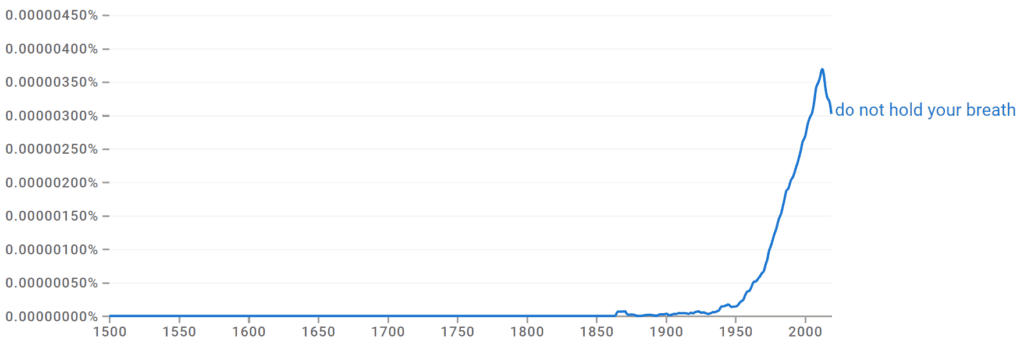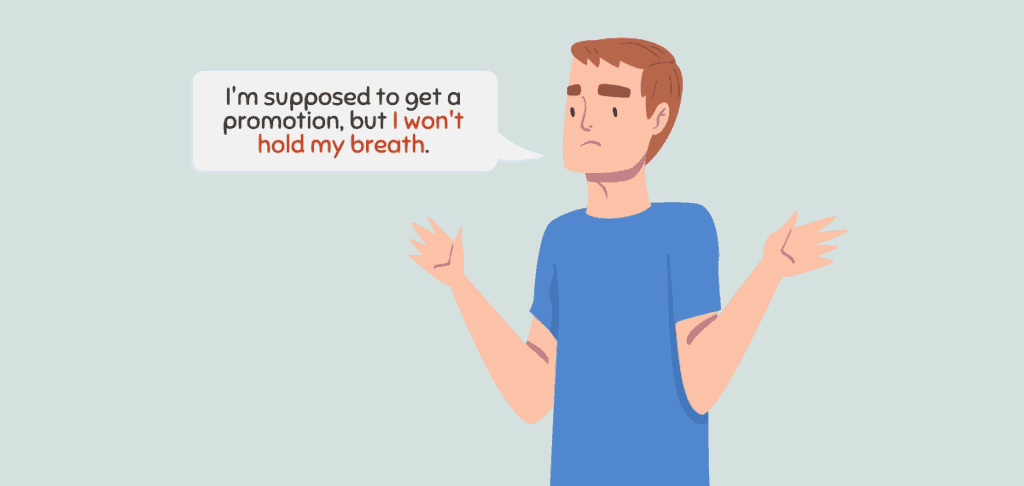Have you ever heard someone say don’t hold your breath? What a strange thing to tell someone, right? Thank goodness there’s no literal intent behind the expression. I’ll go over all the details of what the phrase means and show you how to use it in a sentence.
Don’t Hold Your Breath Meaning Explained
When someone says, “Don’t hold your breath,” they aren’t literally telling you to breathe normally. Instead, this idiom is used to express skepticism that a certain event will happen. Essentially, if someone tells you not to hold your breath, they’re suggesting that you shouldn’t get your hopes up or expect something to occur anytime soon.
Don’t Hold Your Breath vs. I Won’t Hold My Breath
Don’t hold your breath is typically used to tell someone else not to wait expectantly for something that’s unlikely to happen. But when someone says, “I won’t hold my breath,” they’re expressing their own skepticism about how something will turn out.
- “I’ll get those dishes done, I promise,” my teenage son said. “I won’t hold my breath,” I replied with an eye roll.
- “The boss said we’d get more funding for office equipment but don’t hold your breath. That’s what he said last quarter.”
Origin and Etymology of Don’t Hold Your Breath
This phrase is relatively modern, coming from 20th-century American English but likely derived from another, more Shakespearean phrase, “Waiting with bated breath,” which means holding your breath as you wait for something to happen or for someone to reply.
Synonyms for Don’t Hold Your Breath
If you want a few other ways to express the idea, try one of these alternative phrases!
- Don’t count on it
- Don’t bank on it
- It’s a long shot
- I wouldn’t bet on it
- Not likely to happen
Don’t Hold Your Breath Examples in a Sentence
- Did Mary promise to pay you back tomorrow? Well, don’t hold your breath. She’s notorious for ripping people off.
- They said they’d fix the potholes in front of my house by next week, but I won’t hold my breath.
- He said, “I’m hoping to get a raise at the end of the year.” I chortled. “Don’t hold your breath, buddy.”
- “Do you think he’ll show up on time?” he asked. “Don’t hold your breath; he’s always late.”
- They said the flight might leave on time, but don’t hold your breath.
- She’s hoping the noisy neighbors will move out, but I wouldn’t hold my breath.
- I’m supposed to get a promotion, but I won’t hold my breath.
- My son promised to clean his room, but honestly, don’t hold your breath.
- “Will they ever stop arguing?” my friend asked about my parents. I sighed and said, “Don’t hold your breath. They’re like cats and dogs.”
- “Maybe this time the meeting will start on time,” the new hire uttered. I just laughed. “Don’t hold your breath. It’s never happened before.”
Just Breathe!
And that’s a wrap on the expression don’t hold your breath. It’s a handy little idiom to express skepticism and manage expectations, whether yours or someone else’s. So, keep breathing easy, and remember no actual breath-holding is required to use this phrase!
Related Articles:



